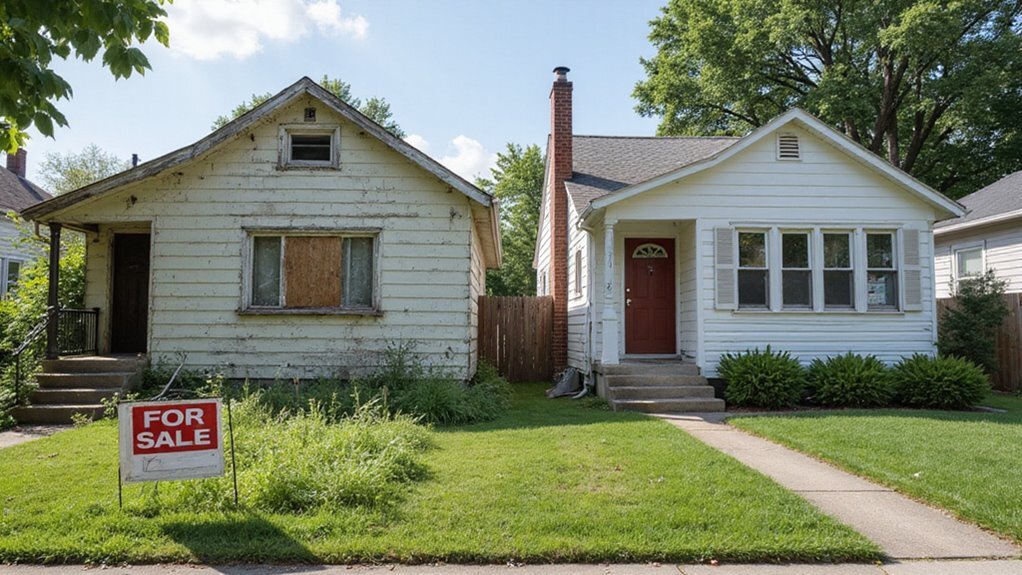Selling a house with code violations can be a real challenge. Most buyers want move-in ready homes, not properties with problems. These violations can make your house harder to sell and could lower your final price.
Many lenders refuse to finance homes with unresolved code issues. This means you may lose out on traditional buyers. Waiting for the right buyer can take longer and drain your energy.
You don’t have to face these problems alone. Selling a house with code violations is different from traditional sales, but there are smart ways to improve your results. By knowing your options, you can avoid costly mistakes and get a fair deal. This blog will guide you through the process and help you sell your house—even with code violations.
Key Takeaways
- Homes with code violations usually sell for less, often up to 10–30% below market value compared to traditional sales without violations.
- Selling with violations often takes longer due to required disclosures, negotiations, and potential repair delays, extending timelines beyond the usual 60–90 days.
- Traditional sales attract more buyers; homes with violations mainly appeal to investors or cash buyers willing to handle repairs.
- Unresolved violations can complicate appraisals and mortgage approvals, while traditional sales usually face fewer financing obstacles.
- Sellers must disclose all known violations, increasing legal risks if issues are hidden, whereas traditional sales involve standard disclosures with lower liability.
Understanding Code Violations in Residential Properties
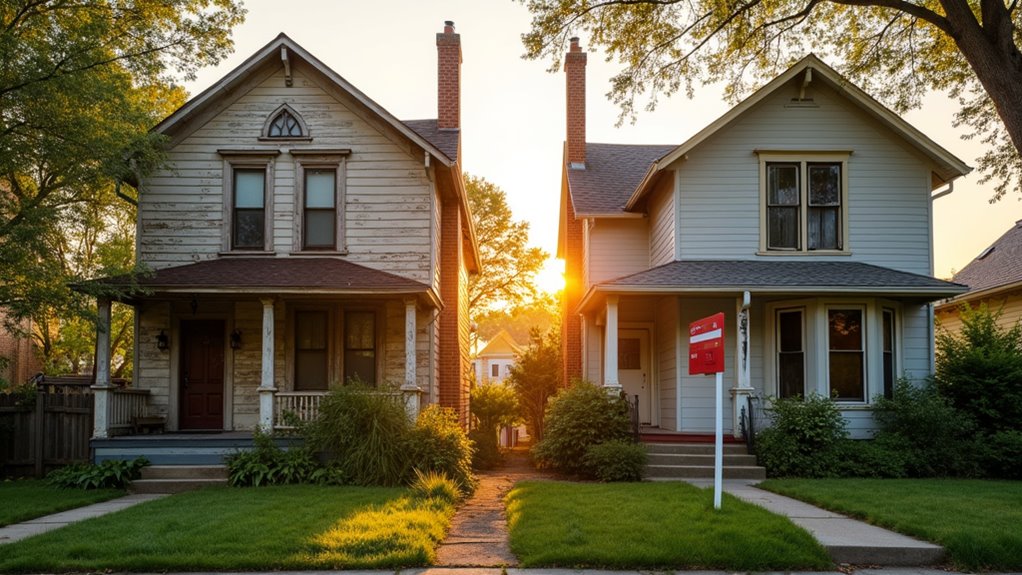
Code violations are any problems with a home that break local building or safety rules. If you are selling a house, you must check for these issues. Fixing them early helps prevent legal or financial trouble. Check for code violations before selling your home—fixing them early can help you avoid costly legal or financial issues.
Zoning laws control how a property can be used and what can be built. If you make changes without following these rules, you could face delays. Sometimes, you might even have to undo any unapproved work.
Environmental hazards like lead paint, mold, or asbestos are also considered code violations. These issues can lower your home’s value and scare away buyers. Studies show homes with these problems can sell for up to 30% less.
If you find and fix code violations before selling, you can avoid problems during negotiations. This will help your sale go faster and smoother. Buyers are more likely to trust a property with no hidden issues.
Conducting comprehensive safety inspections before listing your home can help identify hazards, ensure regulatory compliance, and increase buyer confidence in the sale.
Common Types of Code Violations Homeowners Face
You’ll likely encounter code violations related to structural safety, such as damaged foundations or unstable decks, and electrical system issues like outdated wiring or missing GFCI outlets. According to the National Fire Protection Association, electrical failures are a leading cause of home fires, making prompt repairs critical. By identifying and addressing these common problems early, you can minimize risks and streamline your sale.
It’s also crucial to ensure proper documentation of inspection reports and repair records, as transparency about structural or foundation issues is legally required in many states like Kentucky. Before listing your home, it’s wise to conduct a title search to reveal any outstanding liens or debts that could impact your sale.
Structural Safety Concerns
Structural safety concerns are a leading cause of code violations. Problems with the foundation or roof can make a home hard to sell. These issues often lower the home’s value and scare away buyers.
Foundation issues affect about 25% of homes in the U.S. Roof problems are also common and can be costly to repair. Inspectors often find these violations during the selling process.
If your home has these problems, buyers may ask for a lower price. Lenders might also hesitate to approve loans. You can hire a structural engineer or roofer for an inspection and repairs.
Addressing these concerns before selling can improve your chances of a smooth sale. Fixing the problems may also give you a stronger position in negotiations. If you solve these issues, buyers are more likely to trust your property.
Electrical System Issues
Electrical system issues are a common reason for code violations in homes. These problems can stop a home sale and create safety hazards. Outdated wiring, overloaded circuits, and poor installations are frequent electrical concerns.
The National Fire Protection Association says faulty wiring causes many house fires. If an inspector finds these issues, buyers might back out. Lenders may also refuse to provide financing if the electrical system is unsafe.
Homeowners should upgrade wiring to meet current standards before selling. Professional electrical work increases buyer trust and can raise property value. Fixing these problems early can make selling your home easier and safer.
How Code Violations Impact Property Value
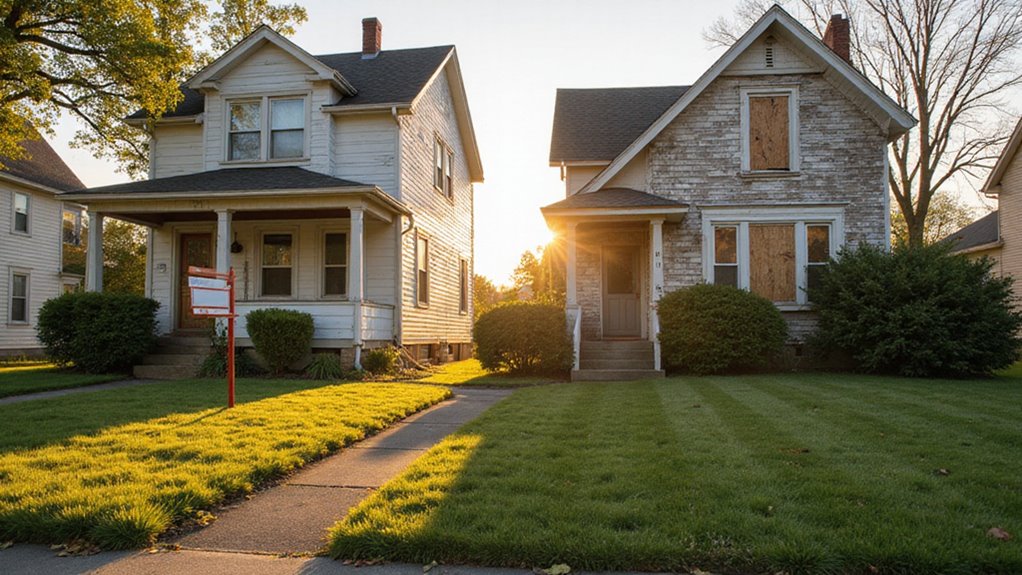
When your property has code violations, you’ll see fewer interested buyers and face more hurdles during the appraisal process. Data shows that homes with unresolved violations can sell for up to 10% less, as buyers factor in repair costs and risks. To protect your property value, it’s essential to address these issues early and work proactively with appraisers.
Taking steps to improve curb appeal can also help offset some of the negative impacts of code violations by making your home more attractive to potential buyers. Additionally, unresolved code violations can create legal claims similar to property liens, potentially complicating the sale process and requiring resolution before closing.
Decreased Buyer Interest
Unresolved code violations often cause fewer buyers to show interest in a property. Buyers worry about safety risks, extra costs, and legal problems. If a property has code violations, its value can drop.
Most buyers want homes that are ready to move into. They may avoid homes with code issues because repairs can be expensive. Reduced interest can force sellers to lower prices or offer special deals.
If you fix code problems before selling, you may attract more buyers. Investors who buy distressed properties may also be interested. Addressing violations early can improve your chances of a successful sale.
Appraisal Challenges Arise
Code violations can make the appraisal process difficult. Appraisers must check the home’s safety, code compliance, and condition. Unresolved violations often lower your home’s appraised value.
These violations require repairs to meet legal standards. Appraisers will subtract estimated repair costs from your home’s value. Homes with violations may lose 10% or more in value compared to similar homes.
Lenders usually avoid homes with code issues. This makes it harder to find buyers who can get a mortgage. If you fix violations before selling, the process becomes easier.
You should get repair estimates to understand possible costs. Resolving issues early can help keep your property’s value high. This approach also helps your sale go smoothly.
Traditional Home Sale Process Overview
Before selling your home, you need to get it ready for buyers. The process includes cleaning, fixing small issues, and making the home look appealing. You should also set a price based on recent sales in your area. It’s important to gather all essential documents for FSBO sales if you decide to sell without a realtor, as having the right paperwork protects both parties and helps ensure a smooth transaction.
A real estate agent can help you list your home and manage showings. Agents use marketing to attract buyers and guide you through negotiations. If you price your home according to local trends, it may sell faster.
Buyers often check neighborhood safety and property taxes before making an offer. If you highlight these points, your home may stand out. Proper preparation and a good agent can help you get the best price. Compared to this process, selling as-is properties usually means skipping repairs and targeting buyers who are experienced with renovations.
The Role of Home Inspections in Traditional Sales
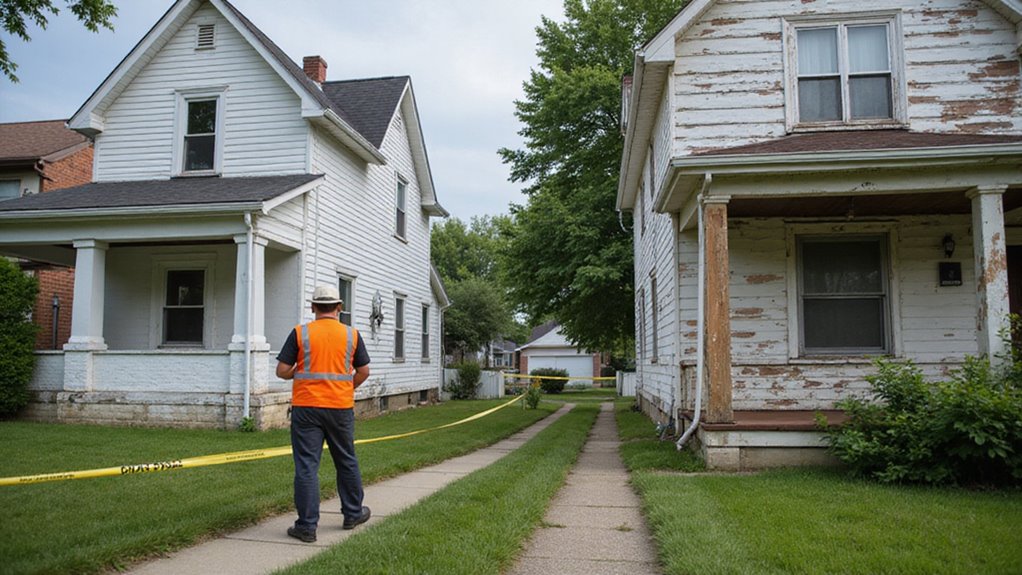
A home inspection is important in a traditional home sale. It gives both the seller and buyer clear information about the property’s condition. If you want fewer surprises, a home inspection helps you prepare.
Inspections show problems early, so you can fix them or adjust your price. Some people think new homes do not need inspections, but every home can have hidden issues. If you believe inspectors find every problem, remember they only check what is visible and major. A thorough inspection may also reveal signs of mold problems, which can have health and safety implications if left unaddressed.
A home inspection can save you money during negotiations. If you have an inspection before listing, your home may sell faster and closer to your asking price. Buyers feel more confident when you share inspection results.
For sellers facing tight relocation timelines, a pre-listing inspection helps avoid delays and strengthens your negotiation position.
The table below shows common myths and the facts:
| Aspect | Common Myth | Data-Driven Fact |
|---|---|---|
| New Homes | Don’t need inspection | All homes benefit from inspection |
| Inspector’s Role | Finds all problems | Identifies major, visible issues |
| Cost | Too expensive | Saves money in negotiations |
| Buyer Confidence | Not affected by inspection | Increases with transparency |
| Sale Speed | No impact | Faster with pre-inspection |
What Happens When a Home Fails Inspection
When a home fails inspection, the sale may be delayed or even canceled. The inspector’s report lists problems that must be fixed. Some issues, like zoning violations, can affect the legality of the sale.
Sellers must review the report and understand what needs repair. If you find major hazards, you should act quickly. Unresolved problems may lower the home’s value or risk the deal falling through. In these situations, the personal representative is responsible for ensuring that any necessary repairs or disclosures are handled according to legal requirements.
You can ask professionals for repair estimates before making decisions. If local rules are involved, you may need to speak with authorities. Addressing the most urgent issues first can help keep the sale moving.
In Kentucky, it’s important to be aware that building code compliance and proper documentation of repairs are crucial for avoiding legal penalties and ensuring a smoother sales process.
Disclosures and Legal Obligations for Sellers
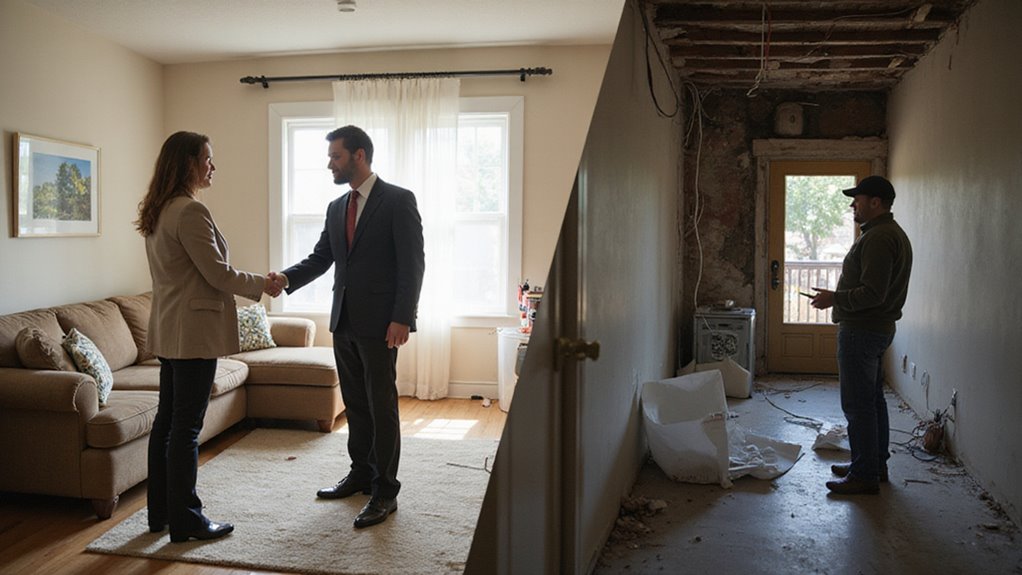
You must tell buyers about any code violations when selling a house. Laws in most states require sellers to share known problems. If you hide issues, you could face lawsuits or lose the sale.
Disclosure forms list defects and code violations. Honest disclosures protect you from legal trouble. If you are honest, buyers take responsibility for fixing problems. In Kentucky, sellers are also required to disclose any mold or water damage to comply with local regulations and avoid penalties.
If you try to hide violations, buyers can sue or demand repairs after the sale. Meeting your disclosure duties makes the sale smoother. You also reduce your legal risks by being transparent.
For those who do not have the time or resources to fix up a house, selling as-is is a common solution that can help you avoid the hassles of making repairs before closing.
Repair Requirements Before Listing Your Home
Before listing your home, you’ll need to address any mandatory repairs required for code compliance, as ignoring them can stall or even block your sale. It’s essential to assess the cost implications of these fixes up front, since data shows that unexpected repairs can reduce your net proceeds by thousands.
Establish a realistic renovation timeline so you can plan your listing strategy and avoid costly delays. Replacing outdated or damaged features, such as energy-efficient windows, can increase your home’s value and attract more buyers in today’s market. In some cases, making minor repairs and updates can streamline negotiations and help you secure a faster, more favorable deal.
Mandatory Repairs for Compliance
You must fix certain issues before selling a property with code violations. Local laws require repairs for health, safety, or environmental concerns. These repairs are necessary to sell your property legally.
Unresolved violations can delay or stop a sale. Issues like environmental hazards and zoning problems need attention first. Compliance helps protect both you and the buyer.
If you have environmental hazards such as mold, asbestos, or lead paint, you must remove them. Zoning disputes, like unapproved additions, must be resolved. Safety problems, including faulty wiring or broken smoke detectors, should be repaired.
Completing these repairs makes selling easier and attracts more buyers. It also reduces your risk of legal trouble. If you address these issues, your sale will likely go smoother.
Cost Implications of Fixes
Fixing mandatory repairs can be expensive. Costs often range from $5,000 to over $10,000, depending on the work needed. You should plan for these expenses before listing your property.
Property tax assessments may go up after repairs. Improvements can increase your home’s value, which may lead to higher annual taxes. Insurance premiums might also rise if major updates are made.
If you skip repairs, buyers may offer less for your home. You may also face legal issues if you ignore mandatory fixes. Investing in repairs helps protect your investment and meets your obligations.
Timeline for Renovations
Renovation timelines depend on the repairs needed before selling a house with code violations. Minor repairs usually take two to four weeks. Major code fixes may take several months to finish.
The project size affects how long renovations take. Large repairs need more planning and time. If you start early, you can avoid delays.
Contractor schedules may impact your timeline, especially in busy seasons. Homeowners should contact professionals as soon as possible. Early booking helps keep the project on track.
Homes must pass final inspections before listing. Local authorities need to approve repairs. If inspections are delayed, your sale may be pushed back.
Good planning helps you finish renovations on time. If you prepare ahead, you can stage your home and attract more buyers. A well-timed sale can improve your final sale price.
Selling As-Is: What It Means for Code Violations
Selling a property “as-is” means you offer it in its current state, including any code violations. Buyers take on all issues, such as safety concerns or structural problems. Sellers do not have to make repairs before closing.
Homes sold as-is often close faster, according to the National Association of Realtors. However, these homes may sell for up to 30% less than renovated ones. If you want a higher price, you may need to fix issues first.
Sellers must disclose any known code violations to buyers. Failure to do this can lead to legal trouble or lower neighborhood safety. If you address major hazards, you help protect both buyers and the community.
Being honest about your property’s condition can prevent future problems. If you are unsure about local rules, you should consult a real estate professional. Transparency helps you sell more responsibly.
Attracting Buyers When Your Property Has Violations

You can attract motivated buyers by highlighting your property’s investment strength and being upfront about existing code violations. Statistics show that clear disclosure improves trust and streamlines negotiations, especially with experienced cash buyers. Focus your marketing on investors who expect repairs and are ready to move quickly.
Highlighting Investment Potential
Even homes with code violations can appeal to investors. If you highlight renovation potential, you may attract buyers seeking value. Many investors search for properties where repairs can raise value.
Properties with issues like old wiring or minor hazards indicate opportunity. Buyers often want projects that could bring strong returns. If your home is in a growing neighborhood, repairs may boost its value.
You should mention that investors might buy for less than market price. This may leave room for profitable renovations. If buyers know repairs can improve the area, they may be more interested.
Addressing environmental hazards could make buyers eligible for grants or incentives. This can further increase buyer interest. If your property offers these benefits, be sure to share them.
Transparency in Disclosure
Sellers should be clear and honest about code violations when selling a house. Full disclosure helps buyers trust you and encourages serious offers. If buyers know about issues early, they are more likely to continue with the sale.
You should list all known problems, such as environmental hazards or zoning issues, in your documents. Providing inspection reports or repair records can help buyers understand the risks. This openness often leads to easier and faster negotiations.
If you are transparent, you reduce the chance of buyers backing out after inspections. Honest disclosure can also prevent legal disputes after the sale. Being upfront is both ethical and smart in a competitive market.
Targeting Cash Buyers
Cash buyers are often interested in properties with code violations. They have the experience and resources to handle repairs. If you want to target them, use clear strategies.
You should highlight the property’s investment potential. Show how neighborhood trends could increase the property’s value. Investors are looking for signs of growth or future development.
Always disclose any code violations at the start. This honesty builds trust and saves time for everyone. Cash buyers expect a fast and honest process.
Offer simple and flexible selling options. A quick closing date can attract more cash buyers. Simple transactions make your property more appealing.
Working With Cash Buyers and Investors
Cash buyers and real estate investors are good options when selling homes with code violations. These buyers care more about the property’s value and less about its appearance. If traditional buyers hesitate, investors may be willing to purchase the home as-is.
Investors look at neighborhood trends and estimate repair costs before making an offer. They often use cash, which speeds up the sale process. If you want to avoid costly repairs, working with an investor can make selling easier.
Sellers usually skip upgrades and save time on negotiations with cash buyers. Investors understand code violations and factor them into their offers. If you need a quick sale, targeting cash buyers is a practical solution.
Timeline Differences: Traditional Sale vs. Selling With Violations
Selling a house with code violations often takes longer than a traditional sale. A standard sale usually involves home staging, inspections, and financing, which can take 60–90 days. Code violations may add more delays because repairs or extra negotiations are needed.
Traditional sales require preparing the home, staging, and meeting buyer conditions. If a home has violations, sellers must disclose problems and may need to negotiate more with buyers. These steps often extend the timeline.
Longer sales can affect the neighborhood. If a home stays on the market, nearby property values may decrease. Buyers may also view the area less favorably.
Financial Considerations and Potential Costs
Even small code violations can lower your profit when selling a house. Buyers may ask for discounts to cover repairs. Appraisers might also reduce your home’s value if they see violations. Small code violations can cut into your profit, as buyers may seek discounts and appraisers might lower your home’s value.
If violations exist, your house may take longer to sell, which increases your holding costs. Insurance companies may charge higher premiums due to extra risk. Market changes can also affect your profit if prices drop while you fix issues.
Neighborhood trends matter as well. In popular areas, buyers might ignore some violations. In weaker markets, these problems can make it hard to find buyers.
You should always consider repair costs, possible price cuts, and delays in closing. Careful planning helps you avoid surprises. If you prepare for these expenses, you can better manage your finances.
Strategies for Navigating a Sale With Code Violations
Selling a house with code violations is possible if you use the right strategies. You should understand your options to reduce stress and avoid problems for your neighborhood. A good plan can help you reach a successful sale.
You should start with a full inspection to learn about all the issues. If you know the violations, you can decide to fix them or sell the house as-is. Weigh the cost of repairs against the possible increase in sale price.
Sellers must tell buyers about all known violations. Transparency helps build trust and prevents legal trouble. If you are honest, buyers are more likely to stay interested.
If you want a quick sale, target investors or cash buyers who accept code issues. You could offer repair credits to make your property more appealing. If you work with a real estate agent who knows about code violations, you can get expert help.
Conclusion
If you are selling a house with code violations, the process will be different from a traditional home sale. You may encounter lower offers and longer selling times. If you understand your options, you can make more informed decisions.
If you choose to work with cash buyers or investors, you could close the sale more quickly. We buy houses for cash, which can help you avoid repairs and complicated negotiations. If you address code violations early, you may reduce surprises during the sale.
If you want a smoother selling experience, consider working with OC Real Estate. We are ready to help you sell your home for cash, regardless of its condition. Contact us today to see how we can help you move forward.
